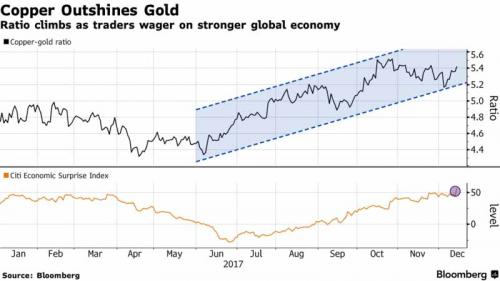Global stocks and US equity futures roared upward to new record highs to start the second-to-last week of the year, boosted by optimism over a Republican agreement on the shape of U.S. tax cuts aimed at lifting growth; incidentally this is the 6th consecutive day that the “tax bill” has been priced in by the market, and according to cynics, 6th consecutive week and/or 6th month. Meanwhile, the dollar dropped and Treasuries headed lower.
World stock markets have surged this year, for the most part on constant expectations of tax reform passing, which is expected to boost corporate profits but mostly trigger share buybacks and higher dividend payouts, to the tune of over $1 trillion. The benchmark MSCI World index rose 0.41% on Monday to hit a fresh record high, putting it on course for its best year since 2009.
In overnight cross-asset developments, it was a low-volume session as traders close out the year, which saw the dollar fall against most G10peers Monday alongside Treasuries as focus remained on Trump’s tax measures. The pound climbed ahead of a speech by PM May. While core euro- area bonds were little changed, peripheral debt from Italy and Spain climbed. Portugal’s bonds rallied, with 10-year yields sliding to the lowest since April 2015 after Fitch Ratings raised the country’s credit ranking two notches to investment grade late on Friday. Portugal’s 10Y bond traded decisively below its Italian equivalent on Monday. The last time it did so for a sustained period was in early 2010. “There is very much a shift in the architecture in the European government bond market,” said DZ Bank rates strategist Daniel Lenz.
Europe’s Stoxx 600 Index rose for the first time in three sessions as real estate, automakers and technology stocks led gains. Germany’s DAX index rose 1.2 percent, with the U.K.’s FTSE 100 up 0.5 percent. Most European bonds rose with Portuguese debt outperforming after Friday’s upgrade from Fitch Ratings. Sentiment was buoyed by ongoing tax reform optimism with the latest reports suggesting that Republican Senators Rubio and Corker are to support the tax bill. In terms of what lies ahead, the House is due to vote on the bill tomorrow, while US Senator Cornyn has stated that Senate will most likely pass the bill tomorrow. In terms of sector specifics, gains are relatively broad-based with individual movers including Gemalto (+6%) and Thales (+4.3%) in the wake of their tie-up at the expense of Atos (-1.3%).
With little in the way of major economic data this week, the GOP tax bill was likely to remain in focus for stock market investors, according to Mike van Dulken, head of research at Accendo Markets. “Ahead of bill being signed into law, any more updated guidance from U.S. corporates, showing potential earnings improvement from the reform, will be closely watched.”
“The odds of the tax cut legislation getting passed within this year have grown,” said Shoji Hirakawa, chief global strategist at Tokai Tokyo Research Institute Co. This “will benefit not only the U.S. but also economies around the globe including Japan, allowing investors to anticipate an increase in corporate earnings.”

Earlier, equity benchmarks in Tokyo, Hong Kong, and Sydney climbed after the S&P 500 Index and other American gauges closed at records on Friday. Australia’s ASX 200 (+0.7%) was higher as miners gained after an early 6% surge in Dalian iron ore prices, while Nikkei 225 (+1.6%) outperformed on JPY weakness and after encouraging Japanese Trade Data in which exports rose a 12th consecutive month. Elsewhere, Hang Seng (+0.7%) was positive and Shanghai Comp. (-0.1%) traded indecisive after a significant CNY 300BN injection by the PBoC (CNY 260BN net), and as some property names lagged after the latest China House Price data continued to show the effectiveness of government measures to cool the property sector.
Meanwhile, Indian shares rebounded as Prime Minister Narendra Modi’s party is set to return to power in his home state, an election that’s considered a bellwether before the national vote in early 2019. The NIFTY rose 0.7% after being down 2% at the start of trade as early results suggested a closer race in Gujarat between the ruling BJP and the opposition Congress Party than what was seen in Friday’s exit polls. However, stocks later pared losses and then some, after the BJP pulled ahead and trends pointed to a comfortable majority win
The dollar pared its Friday gains even as Treasuries dropped, with investors’ greater focus still on tax reform. Volumes were relatively low as traders noted holiday liquidity slowly emerging in the major currencies. EMFX edged higher with politics driving price action, while global equities surged amid improved risk appetite. The euro gained and sterling advanced before U.K. Prime Minister Theresa May sets out her plan for a proposed Brexit transition period. The euro strengthened after two days of declines. South Africa’s rand rose on optimism Cyril Ramaphosa will become the next leader of the ruling African National Congress party.
Looking at the latest weekend developments involving UK’s messy divorce, EU Brexit Chief Michel Barnier said the EU is not prepared to come up with a makeshift trade deal for the UK that knits together all the best bits of existing models. Following this, the Telegraph have reported that this will lead to a cabinet row in the UK. The Telegraph have also reported that leading Remain campaigners plan to utilize the ‘meaningful vote’ on final Brexit deal with the aim of keeping UK in the EU. On the subject of trade, Guardian reported that Britain’s banks have written to Theresa May and Philip Hammond warning that a Canada-style free trade agreement with the EU post-Brexit is not ambitious enough and that alignment with EU rules on finance is crucial.












Leave A Comment